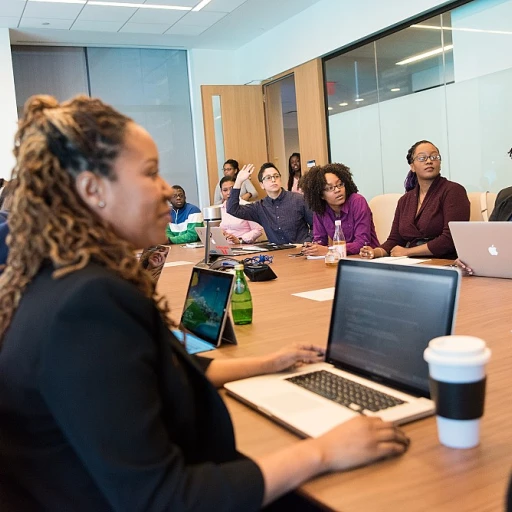
Understanding the Role of a Learning and Development Consultant
Exploring the Landscape
In the ever-evolving business environment, a Learning and Development Consultant plays a pivotal role. At the crossroads of skills enhancement and organizational performance, these professionals offer strategic insights and solutions. They guide companies through the often complex terrain of workforce development, ensuring that learning initiatives align with long-term goals. The primary function of a development consultant is to assess and understand the unique learning needs within a business. This involves identifying specific skills gaps that can affect overall performance and designing innovative solutions to address them. Consultants employ a range of methods, from direct observation to leveraging technology, to gather critical insights. Their expertise determines the direction of tailored training programs that meet the needs of both employees and the organization. Moreover, these consultants are instrumental in translating business objectives into actionable learning strategies. This includes partnering with top-tier consulting firms to design instructional strategies tailored to the specific goals of a company. They work hand in hand with management and L&D teams to provide advisory services, training solutions, and development consulting. Their role is essential in creating a sustainable environment for continuous learning and development. As a strategic partner, a Learning and Development Consultant not only conceives effective training programs but also collaborates closely with organizations to ensure seamless implementation. Their goal is to foster a learning culture that encourages innovation and enhances workforce capabilities. These consultants are crucial in helping businesses stay competitive by preparing them for future challenges and opportunities. To further explore the contributions of a Learning and Development Consultant, check out insights from a reskilling journey.Identifying Skills Gaps and Future Needs
Pinpointing Where Skills Gaps Lie
In today's rapidly evolving business landscape, learning and development consultants play a crucial role in accurately identifying skills gaps within an organization. This process involves gathering insights on current employee performance, anticipating future workforce needs, and assessing the alignment between existing capabilities and strategic objectives. Consultants often begin by performing a comprehensive skills analysis, which provides invaluable data on the current workforce competencies. This analysis typically involves:- Consultation with management and l&d departments to grasp the strategic vision of the business.
- Evaluation of existing training programs and initiatives.
- Use of technology to track and analyze employee performance metrics and training outcomes.
Strategic Alignment for Future Needs
In addition to pinpointing existing gaps, an effective learning and development consultant must consider future needs. Organizations constantly face evolving market conditions, technological advancements, and shifts in customer expectations. Consequently, anticipating how these changes could impact skills requirements is vital. This strategic foresight not only positions businesses for success but also allows for the design of effective and forward-thinking training development programs. Consultants often hold advisory services and work closely with business leaders to ensure alignment of training solutions with long-term company goals. For those embarking on this transformative journey, it's essential to understand that identifying skills gaps is an ongoing process. Continuous development, feedback loops, and adaptation to emerging trends are integral parts of the way forward. As we progress into the next stages of reskilling, designing and implementing sophisticated training solutions becomes critical. To understand the variety of paths available for reskilling, take a moment to explore navigating the path to degreed careers—a reskilling journey, offering deeper insights into effective pathways.Designing Tailored Reskilling Programs
Crafting Tailored Skill Development Pathways
The third step in the reskilling process involves crafting learning solutions that are specifically tailored to the needs of the organization and its workforce. This tailoring ensures that the training solutions provided are not just generic, but instead address the specific skills gaps identified in the business. In the realm of training development, learning and development (L&D) consultants hold the critical responsibility of designing programs that align with the strategic goals of the organization. These consultants often work in collaboration with strategic management to ensure the programs are both relevant and forward-thinking. This involves leveraging technology and innovative instructional designs to build engaging and effective training initiatives. Furthermore, development consultants often offer advisory services that enhance organizational performance by suggesting best practices in L&D. These advisory services can involve workshops, seminars, or one-on-one coaching sessions. The end goal is to foster an environment where ongoing skills development is part of the organizational culture. When designing these tailored programs, it's crucial for consultants to consider the diversity of the workforce. Different employees have varying levels of exposure to technology, learning preferences, and career goals. Thus, the programs should be flexible enough to accommodate these differences while still maintaining a cohesive structure that supports the organization's objectives. By providing training consultants who can adopt a holistic view of both the organization and the individual learner, consulting firms can offer development services that are comprehensive and impactful. These carefully designed programs are not only about bridging current skills gaps but also about preparing employees for future challenges and opportunities. Engaging with a development consultant can thus be an essential step toward empowering the workforce through reskilling. Discover more about transformative reskilling solutions here.Implementing Effective Training Strategies
Strategic Implementation of Training Initiatives
Implementing effective training strategies is a crucial step in the reskilling journey. Learning and development consultants play a pivotal role in ensuring that training programs are not only well-designed but also strategically executed to meet the organization's goals. This involves a deep understanding of the business's strategic objectives and aligning the training initiatives accordingly.
One of the key responsibilities of an L&D consultant is to ensure that the training solutions are tailored to the specific needs of the workforce. This requires a comprehensive understanding of the skills gaps identified earlier and the future needs of the organization. By leveraging their expertise in instructional design and project management, consultants can create training programs that are both engaging and effective.
Utilizing Technology for Enhanced Learning
In today's digital age, technology plays a significant role in the implementation of training strategies. L&D consultants must be adept at incorporating technology into their training solutions to enhance learning and development. This could involve using e-learning platforms, virtual reality simulations, or mobile learning applications to deliver training content in a more interactive and accessible manner.
Moreover, technology can also aid in tracking the progress and performance of the workforce during the training programs. By utilizing data analytics, consultants can gain insights into the effectiveness of the training initiatives and make necessary adjustments to improve outcomes.
Ensuring Continuous Improvement
Effective training strategies are not a one-time effort but require continuous evaluation and improvement. Development consultants need to establish mechanisms for feedback and assessment to ensure that the training programs are meeting their objectives. This involves gathering feedback from participants, analyzing performance metrics, and making data-driven decisions to refine the training solutions.
By fostering a culture of continuous learning and improvement, organizations can ensure that their workforce remains competitive and adaptable in a rapidly changing business environment. L&D consulting services are instrumental in guiding organizations through this process, providing the expertise and advisory services needed to achieve sustainable success.
Measuring Success and Impact
Evaluating the Outcomes of Reskilling
Measuring success and impact in reskilling initiatives is a vital component that cannot be overlooked. As a Learning and Development Consultant, your role is instrumental in determining whether the strategic objectives of training programs are met, and how well they contribute to business performance. Evaluation can focus on several aspects to comprehensively understand the effectiveness of reskilling efforts.
First, assess the improvement in skills post-training development. This can be achieved through pre and post-assessments that quantify the development in a workforce's competencies. Effective instructional design should lead to noticeable enhancements in employee skills that align with identified skill gaps and future organizational needs.
Qualitative feedback is another critical parameter. Engaging with trainees and stakeholders provides insights into how training services resonate with the learning experiences. L&D consultants thus gather valuable data that can inform future training solutions and improvement areas.
From a business perspective, measuring the impact of reskilling on productivity and efficiency is key. Consulting firms often align reskilling outcomes with business metrics. For instance, improvements in process efficiency, error rates, or customer satisfaction can reflect the success of L&D initiatives.
Lastly, assessing the adaptability and flexibility of the programs designed by development consultants is important. Effective reskilling programs should evolve with technological advancements and business changes, ensuring they remain relevant and beneficial to the organization's strategic goals.
Overcoming Challenges in Reskilling
Addressing Reskilling Obstacles
As organizations embark on reskilling initiatives, various challenges can arise that may hinder the successful transition of the workforce. Overcoming these obstacles is critical to ensure a smooth and effective learning experience. Here are some of the common challenges faced by learning development consultants and ways to address them:- Resistance to Change: Employees may be hesitant to embrace new learning methodologies or training programs due to fear of the unknown. It's essential for consultants to communicate the benefits clearly, illustrating how reskilling contributes to individual career growth and organizational success. Constructive communication, involving managers and strategic leaders, can help alleviate concerns.
- Aligning with Business Objectives: Ensuring that reskilling efforts align with the organization's strategic goals can be challenging. L&D consultants need to work closely with senior leaders, such as vice presidents and managers, to design programs that support the organization's long-term vision and business performance.
- Resource Constraints: Limited resources can impact the effectiveness of training development. Consultants should employ innovative solutions such as instructional design optimizations and cost-effective training initiatives to maximize available resources efficiently.
- Keeping Pace with Technology: The rapid evolution of technology requires continuous updates to training programs. L&D consultants should stay informed about the latest technological trends and integrate them into training solutions. Engaging with development consulting firms or partnering with consulting services specializing in technology-driven learning solutions can facilitate this process.
- Measuring Impact: Accurately assessing the success and impact of reskilling initiatives is a common hurdle. Consultants should deploy robust evaluation tools and metrics that reflect the enhanced skills and resulting organizational performance.













